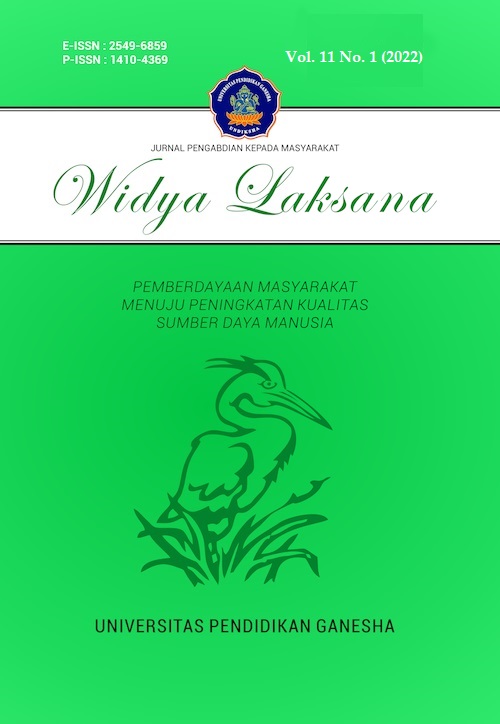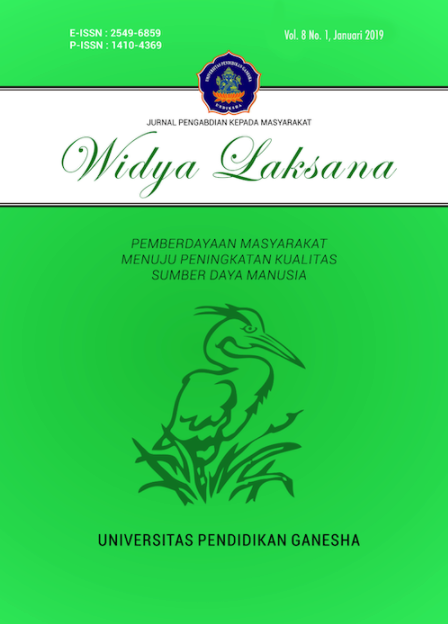PENINGKATAN KETERAMPILAN MENULIS KREATIF BERMUATAN PENDIDIKAN BUDI PEKERTI PADA GURU-GURU SEKOLAH DASAR MELALUI HYBRID LEARNING
DOI:
https://doi.org/10.23887/jwl.v11i1.37151Abstract
This service activity aims to improve creative writing skills with character education for elementary school teachers through face-to-face and virtual training. The participatory method was used in this training to stimulate teachers to be active in practicing poetry writing both in theory and practice. Face-to-face meetings were held twice for theoretical training, while virtual meetings were held for practical training in writing poetry and presenting it. Based on the results of scoring the ability to write poetry in the posttest session, the classical ability in writing poetry was 84.90%, where at the pretest stage it was 70.79%. The results show that poetry writing training containing character education through a mixed face-to-face and virtual method (Hybrid Learning) is able to improve the ability of elementary school teachers in writing creative poetry types. The improvement in the poetry writing skills of the participants was seen in all aspects of writing poetry, including themes and meanings, the power of imagination, accuracy of diction, and the message.
References
Amelia, Z. Y., & Dhita, A. N. (2020). Full day school sebagai strategi penguatan pendidikan karakter dalam era globalisasi. Jurnal Nalar Pendidikan, 8(1), 1-8.
Anggraeni, K. (2017). Efektivitas Model Menulis Kolaborasi Dengan Media Big Book Terhadap Keterampilan Menulis Kreatif. Jurnal Cakrawala Penda, 3(2).
Angreany, F., & Saud, S. (2017). Keefektifan Media Pembelajaran Flashcard Dalam Keterampilan Menulis Karangan Sederhana Bahasa Jerman Siswa Kelas Xi Ipa Sma Negeri 9 Makassar. Eralingua: Jurnal Pendidikan Bahasa Asing dan Sastra, 1(2).
Arsanti, M. (2018). Pengembangan bahan ajar mata kuliah penulisan kreatif bermuatan nilai-nilai pendidikan karakter religius bagi mahasiswa prodi PBSI, FKIP, UNISSULA. KREDO: Jurnal Ilmiah Bahasa dan Sastra, 1(2), 69-88.
Arsini, N. W. A. (2021). Eksistensi satua bali sebagai media pendidikan karakter siswa di sd negeri 10 pedungan, denpasar selatan. VIDYA SAMHITA: Jurnal Penelitian Agama, 6(2).
Astuty, A., Farikah, F., & Ekawati, M. (2021). Peningkatan keterampilan menulis puisi berbasis pendidikan karakter menggunakan teknik kata kunci. Indonesian Journal of Education and Learning, 4(2), 494-499.
Desrani, A., & Adnani, K. (2020). Pendidikan Karakter Dalam Program Asrama Bahasa Arab Menghadapi Era Revolusi Industri 4.0 Di Man 3 Palembang. KoPeN: Konferensi Pendidikan Nasional, 2(1), 42-47.
Dibia, I. K., Dewantara, I. P. M., & Widiana, I. W. (2017). Pemberdayaan Teknik Bercerita Berbasis Budaya Bali Dalam Pembelajaran Keterampilan Menulis Karangan Pribadi Siswa Kelas V SD Mutiara Singaraja. Journal of Education Research and Evaluation, 1(2), 113-119.
Emha, R. J., Abdullah, V. A., Pujiati, T., & Iskandari, Y. (2020). Pelatihan virtual menulis puisi di masa pandemi COVID-19 untuk meningkatkan budaya literasi di SMP negeri 1 karangampel kab. indramayu. Abdi Laksana: Jurnal Pengabdian Kepada Masyarakat, 1(3), 331-335.
Gurning, E. O. (2021). Upaya Meningkatkan Keterampilan Menulis Cerpen Melalui Metode Latihan Terbimbing Dengan Media Teks Lagu Pada Siswa Kelas XII MIA-1 SMA Negeri 16 Medan. Cybernetics: Journal Educational Research and Social Studies, 151-160.
Idawati, I., Hasibuan, N. S., & Nurkholija, A. (2021). Pembinaan minat sastra anak melalui pelatihan menulis puisi bebas dengan aksara arab melayu di mdta muhammadiyah sigiring giring dan mdta muhammadiyah sadabuan. Aptekmas: Jurnal Pengabdian Kepada Masyarakat, 4(2).
Izhar, I. (2017). Peningkatan Kemampuan Menulis Puisi dengan Menggunakan Model Pembelajaran Inkuiri pada Siswa Kelas IV MIN 4 Bengkulu Tengah. Diksa: Pendidikan Bahasa dan Sastra Indonesia, 3(1), 12-23.
Lubis, S. S. W. (2017). Keterampilan menulis essai dalam pembentukan berpikir kritis mahasiswa prodi PGMI UIN Ar-Raniry Banda Aceh. PIONIR: Jurnal Pendidikan, 6(2).
Maryova, F., Anggraini, T. R., & Hastuti, H. (2019). Pelatihan Menulis Puisi dengan Deret Kata di SMA Perintis 2 Bandar Lampung. Adiguna: Jurnal Pengabdian dan Pemberdayaan Masyarakat, 4(1), 11-14.
Muhajir, M., Fatimah, M., & Rohmah, R. (2021). Peningkatan Keterampilan Menulis Puisi Siswa Kelas VIII SMP Al Falah Pacul Bojonegoro dengan Model Pembelajaran Examples Non Examples. Attanwir: Jurnal Keislaman dan Pendidikan, 12(1), 115-123.
Nalenan, J. S. (2020). Pelatihan Menulis Puisi Dengan Media Gambar Pada Siswa Kelas VII SMP Negeri Kota Baru Kefamenanu. Bakti Cendana, 3(2), 92-98.
Nurrachman, D., & Ratnaningsih, S. R. (2019). Memfungsikan Imajinasi: Sosialisasi Menulis Kreatif Menggunakan Wordless Book pada Murid Kelas IX di MTs GUPPI Cileuksa, Desa Legok Kaler Kec. Paseh Kab. Sumedang. Al-Khidmat, 2(2), 36-42.
Pertiwi, S., & Kolen, K. V. (2020). Pengaruh Media Film Terhadap Keterampilan Menulis Narasi Pada Mata pelajaran Bahasa Indonesia Pada Siswa Kelas V SD 02 Pagi Cipayung. Jurnal Inovasi Pendidikan MH Thamrin, 4(1), 10-19.
Safitri, V., & Dafit, F. (2021). Peran Guru Dalam Pembelajaran Membaca Dan Menulis Melalui Gerakan Literasi Di Sekolah Dasar. Jurnal Basicedu, 5(3), 1356-1364.
Wardiah, D. (2017). Peran Storytelling dalam Meningkatkan Kemampuan Menulis, Minat Membaca dan Kecerdasan Emosional Siswa. Wahana Didaktika: Jurnal Ilmu Kependidikan, 15(2), 42-56.
Downloads
Published
Issue
Section
License
Authors who publish with the Widya Laksana agree to the following terms:- Authors retain copyright and grant the journal the right of first publication with the work simultaneously licensed under a Creative Commons Attribution License (CC BY-SA 4.0) that allows others to share the work with an acknowledgment of the work's authorship and initial publication in this journal
- Authors are able to enter into separate, additional contractual arrangements for the non-exclusive distribution of the journal's published version of the work (e.g., post it to an institutional repository or publish it in a book), with an acknowledgment of its initial publication in this journal.
- Authors are permitted and encouraged to post their work online (e.g., in institutional repositories or on their website) prior to and during the submission process, as it can lead to productive exchanges, as well as earlier and greater citation of published work. (See The Effect of Open Access)




